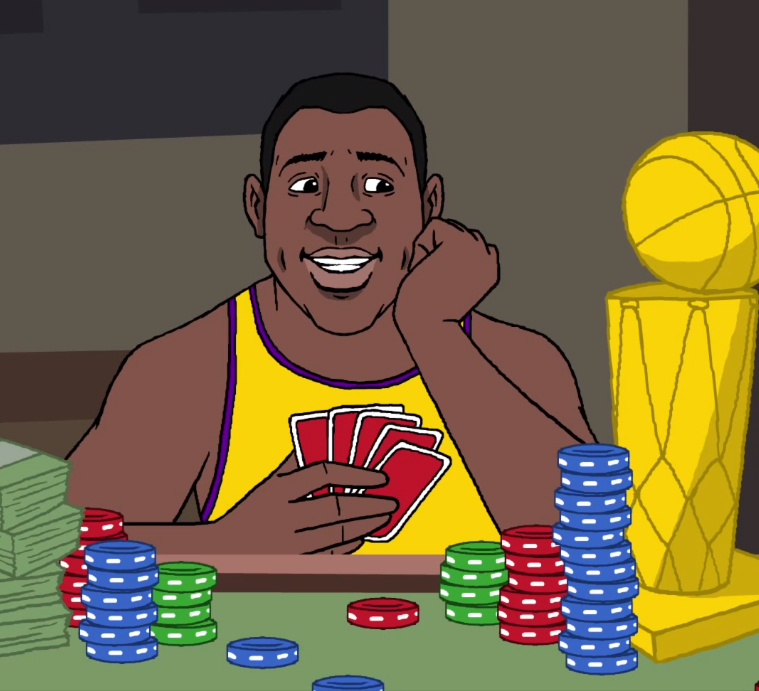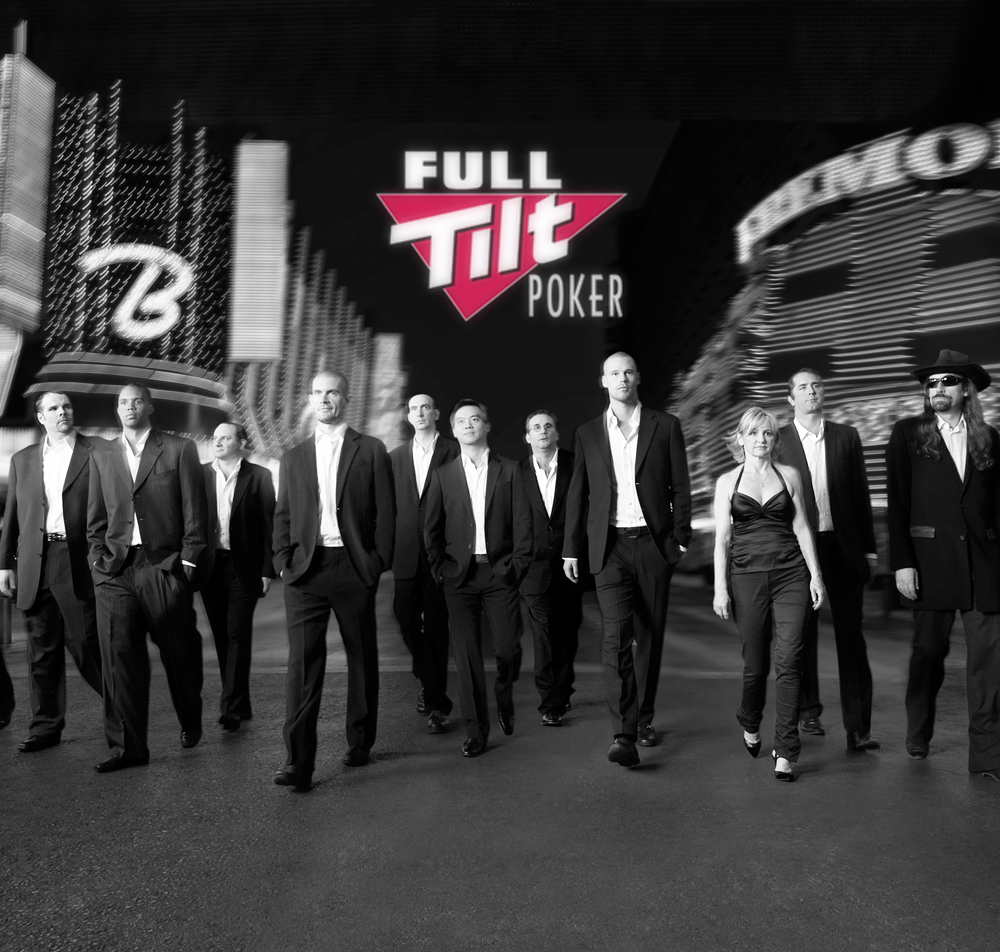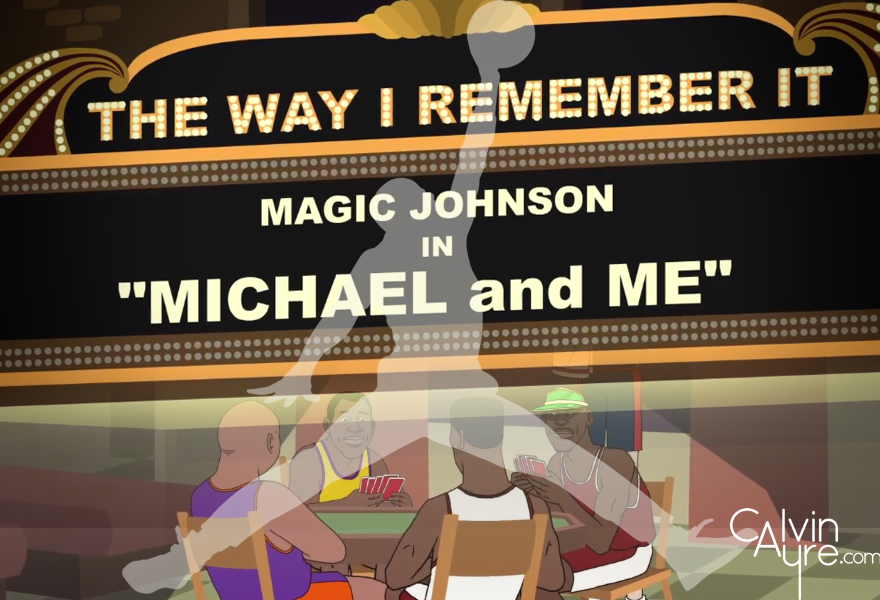Magic versus Michael the shark
 I came across this video last night. It’s an animated version of a short conversation with NBA Hall of Famer Magic Johnson about his 1992 Olympics teammate Michael Jordan that’s highly entertaining and worth a watch:
I came across this video last night. It’s an animated version of a short conversation with NBA Hall of Famer Magic Johnson about his 1992 Olympics teammate Michael Jordan that’s highly entertaining and worth a watch:
Magic describes playing cards with Jordan late into the night, after Scotty Pippen and Charles Barkley had gone lost and gone to sleep. Magic, ahead for the night and looking to rest so he could go out and try to win a gold medal for his country, wanted to go to sleep. Instead he was browbeaten into playing into the middle of the morning so Jordan could win his money back. MJ got even, dozed for an hour, and still made it to his 8 a.m. tee time – presumably betting on that as well.  All of that and he still dropped 20 points in the first half of an Olympic basketball game, before returning to play cards all night once again.
All of that and he still dropped 20 points in the first half of an Olympic basketball game, before returning to play cards all night once again.
The golf, the cards, the lack of need for something so base as a full night’s sleep when there was action to be had: aside from the whole “single most gifted basketball player of his generation if not all-time” thing, Michael Jordan sounds exactly like a traveling professional tournament poker player. If his career had somehow ended due to injury, it sounds like #23 could have had a career on the felt. It’s not hard to imagine him playing a round in the morning before showing up at Bellagio for Day 2 of a World Poker Tour event – or moving over to Bobby’s Room after the tourney for all-night cash games with Doyle Brunson, Daniel Negreanu, and Phil Ivey. Maybe in another universe…
Death of the sponsored pros
Doyle, Daniel, and Phil are upper echelon players, but the poker boom provided a means for all sorts of good-but-not-great players to live pretty high, too: sponsorship.
Before Full Tilt Poker launched in 2004 there were a handful of players who were sponsored, but most of them had won the World Series of Poker Main Event. Once Full Tilt built a highly successful marketing campaign around the concept of allowing players to sit at the same table as sponsored pros, the entire industry rushed to adopt the same approach. And once the rest of the industry was on board, Full Tilt, too, expanded its standards for what it took to become sponsored, giving rise to the Red Pro.
 No longer did you have to be Gus Hansen, John Juanda, or Chris Ferguson to get a sweet deal; now you could be Billy “The Croc” Argyros, Soraya Homam, or Sigi Stockinger. Other rooms with even more liberal standards than Full Tilt’s still racked up big rosters of sponsored players, some of whom were so obscure that they hadn’t even heard of themselves. Winning a single tournament was often enough to land a sponsorship – and sometimes even that wasn’t necessary if the player seeking the sponsorship was young, good looking, and living in a previously untapped market.
No longer did you have to be Gus Hansen, John Juanda, or Chris Ferguson to get a sweet deal; now you could be Billy “The Croc” Argyros, Soraya Homam, or Sigi Stockinger. Other rooms with even more liberal standards than Full Tilt’s still racked up big rosters of sponsored players, some of whom were so obscure that they hadn’t even heard of themselves. Winning a single tournament was often enough to land a sponsorship – and sometimes even that wasn’t necessary if the player seeking the sponsorship was young, good looking, and living in a previously untapped market.
It’s a different story today. The salad days of the poker boom have faded into memory along with the old Full Tilt. Forget about full rakeback deals, bonuses for making it to the final table of any old tournament, and the kind of money that makes it easy to travel and live a high-roller lifestyle. Aside from the glamour pros whose fame dates back to the early days of the boom, the sponsored pros of today are basically at the mercy of the poker rooms.
The infant online poker market was able to support enormous numbers of sponsored pro players when there were still masses of poker players out there waiting to be drawn to the tables. Not only can today’s fragmented market not bear the weight of so many sponsorships, there’s no need for them. The world’s online poker markets have matured, and there’s no better evidence than the return of the room that started it all. When the new Full Tilt launched its sponsored player roster was exactly three names long, and everybody in poker already knew all three of them.
I know what you did last summer…and you owe taxes on it
There’s somebody else out there who knows poker players’ names: the Swedish tax authority. And when Skatteverket knows your name, they don’t play around.
 Agents of the Scandinavian nation’s Serious Fraud Office have been investigating players who the authorities think haven’t given a full account of their winnings on tax-free sites. After using player-tracking websites and other data available on the web, they put together a list of players who presumably had underreported by Skatteverket’s standards between 2008 and 2011. In late November they launched coordinated raids on those players’ homes, in some cases confiscating computers based on the tax authority’s research.
Agents of the Scandinavian nation’s Serious Fraud Office have been investigating players who the authorities think haven’t given a full account of their winnings on tax-free sites. After using player-tracking websites and other data available on the web, they put together a list of players who presumably had underreported by Skatteverket’s standards between 2008 and 2011. In late November they launched coordinated raids on those players’ homes, in some cases confiscating computers based on the tax authority’s research.
According to a letter sent to players, Skatteverket considers playing poker online on internet sites based outside the European Economic Area to be exactly the same as playing live poker outside the EEA: winnings are subject to capital gains tax. The authority wants screen names, poker account statements, online wallet statements, credit card statements (but curiously, not the firstborn children) of everyone who played at sites outside the EEA. Specifically mentioned are PokerStars, Full Tilt, Absolute, and Bodog. (Sites like 888 and Party Poker, hosted within the EEA, are tax-free.) Also specified in the letter is that account statements from as far back January 2008 should be printouts or screen shots, rather than saved PDF or Excel versions of that. No problem with that, is there? Because everybody in poker keeps diligent printout-and-screenshot-based records instead of maintaining spreadsheets or saving PDFs of their account summaries – especially when they’re playing sites that the government hasn’t favored with tax exemption.
The whole thing screams extortion, which shouldn’t be surprising. Poker players rode pretty high throughout the boom and still did well even as that boom began to recede, and nothing attracts a crowd like success. But the ploy seems like it will have different impacts on different players. Guys who keep poor records (whether habitually or with an eye to this kind of eventuality) might actually get by without losing too much, considering the government is relying on the players’ own record-keeping to verify data it collected on its own. But players who were sponsored at events held outside the EEA (like Viktor Blom, to name one high-profile example) will be easier to pin down considering their associations are well-known and other people tend to do very diligent record-keeping for them.
Of course, the government could just crack down on everyone and throw them in solitary like Gottfrid Svartholm if they complain about it. Then again, these aren’t copyright infringers being held for angering Hollywood; they’re guys with a lot of money (at least in theory), and every government loves money. Players had until December 10th to respond and there haven’t been anymore raids yet, so things might still end without any broken lives in the wake.
